A customer-centric definition of content marketing and evolutions in the views regarding content marketing.
What’s the definition of content marketing? There are many definitions as content marketing is an umbrella term, covering different business goals and marketing practices. It gets used in an ever increasing number of areas. Furthermore, it evolves, along with the marketing and customer reality.
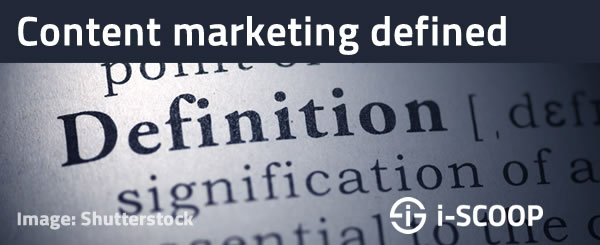
The most often used definition is that of the Content Marketing Institute: “the technique of creating and distributing relevant and valuable content to attract, acquire and engage a clearly defined target audience in order to drive profitable customer action”.
This is the way Joe Pulizzi originally defined it, even if the definition has been evolving too.
Defining content marketing: a matter of context
The definition of content marketing further depends on your viewpoint and background. A B2B marketer, looking to generate and nurture leads, for instance, might look differently at it than a brand marketer, looking to cause a shift of brand perception, or a search engine optimization practitioner, trying to increase organic ranking of content in search engines. However, the rules of good content marketing and essential strategies and principles are very much alike in most cases.

In fact, at the basis, content marketing is a customer-centric and integrated marketing approach. More about that in our ‘Customer-centric content marketing manifesto‘.
One of the key similarities in all the different ways of looking at content in marketing is that the customer experience and needs, preferences and questions of people and so-called target audiences are at the center.
A consistent use of relevant content runs like a thread through all marketing activities. Good content is essential everywhere so using it in a smart way is key too.
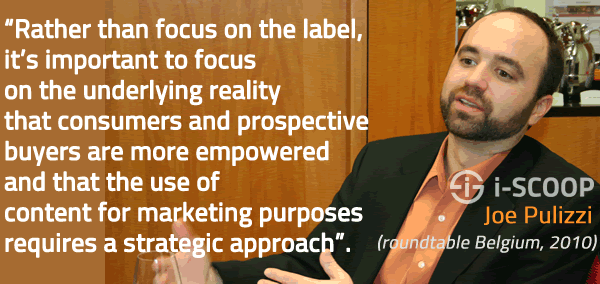
What is content marketing: how we define it
Here is our working definition
Content marketing is an umbrella term covering a set of strategies, techniques and tactics to fulfill business and customer goals by using content across the customer life cycle and the business functions in a consistent, integrated and continuous way.
Content marketing is not about advertising campaigns. It’s not the same as using content in a systematic way for search engine marketing, PR or other forms of marketing alone either.
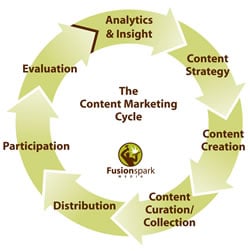
Good content attracts, informs, persuades, serves and engages buyer personas, prospects, customers and other target audiences across the entire life cycle and relationship with your organization and brand. It responds to the questions and needs of (prospective) customers during and after their buyer journey in correlation with direct and indirect business goals.
Outside of the strict buyer journey context, it engages people and audiences and causes change and action, on the short-term, mid-term and long-term but with a clear focus on the latter. In that sense, it’s essential to move away from a campaign-only mentality to a consistent approach.
Content marketing is also used from a branding perspective and in correlation with other offline – and increasingly – digital marketing and business goals. From the branding view, “new” terms have been introduced, such as ‘native advertising’, ‘brand journalism’, etc.
Why you need a pragmatic content marketing definition and approach:
- It doesn’t really matter what content marketing stands for. The debates around the definition of content marketing and even its value will not make the lives of your customers better nor will they improve your business. Content marketing is not a holy grail, it’s a popular term for a way of working with content to do better. On the other hand the debate does matter in the sense that often you will read things about content marketing that aren’t correct because the definition was wrong to start with. And misinformation can lead to wrong decisions.
- Focus on your customers and overall marketing. As a marketer you want to know what works and what your customers need, not the little debates over definitions. Your customers don’t care about your content marketing definition, nor will your CEO. No one is even forced to like or use the term, all that matters are good marketing practices and great customer experience.
- Nobody agrees anyway. This is partially because people with different backgrounds all look at content marketing from their own perspective and individual goals: branding, acquisition, retention, SEO, demand generation, media strategies, etc.
- Content is essential, no matter what. The focus on the term content marketing should not take our attention away from this simple fact, that is true since long before the term was invented: people ‘consume’ content, they use it to prepare a purchase, they like it regardless of their relationship with you, words and images are essential in human behavior and persuasion and content plays a role in virtually all marketing tactics. A good content marketing strategy is really a mix of different tactics and strategies, aligned with the buyer journey and overall marketing strategy.
Content marketing and campaigns
Content marketing is part of a broader mix and not the new buzzword but a methodical approach.
We don’t consider marketing campaigns, even if multi-channel and customer-centric, with lots of content as content marketing either as 1) they have existed forever and are not an indication of content marketing maturity and 2) content marketing is an ongoing effort. An example of why this makes sense: we often notice that brands winning content marketing awards for campaigns have websites – their predominant online presence – that don’t even respect the basics of offering the relevant content potential and existing customers in the broadest sense HAVE to be able to find. Again, this doesn’t mean that good marketing campaigns aren’t characterized by the right content, among others.
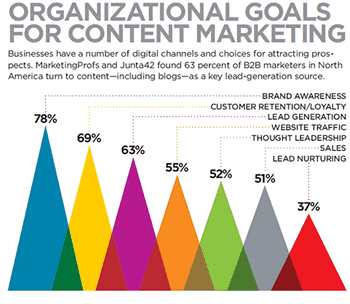
Content marketing: driven by other marketing and business tactics and processes
The other way around, several ‘old’ and new principles and processes of content marketing but also of social business, web content management, web design, analytics, publishing and more can be applied to other marketing tactics to make them perform better. Finally, tactics such as search, analytics, social etc. can play a role in detecting content needs and in optimizing content for specific goals/segments and making it available through the channels and touchpoints that matter.
One of the key challenges in defining a content marketing strategy is to connect the content life cycle, the customer life cycle, brand touchpoints, different scenarios and personas, various goals and ways (channels, media, content) to achieve them and the proper processes of collaboration involving key stakeholders and – more than ever – customers and other members of the broader ecosystem (e.g. so-called influencers) themselves.
Defining content marketing: evolutions and overlaps
As content marketing became increasingly popular and adopted by many people with many backgrounds, the focus in the definitions and approaches shifted more towards the quality and strategy dimension.
This could be witnessed in the many books written about the topic. In his book ‘Epic Content Marketing’, Joe Pulizzi urged marketers to have a content marketing mission statement. US research from the Content Marketing Institute consistently showed the lack of strategy – and impact of it.
This same phenomenon was found in other countries, such as the UK and even in research in smaller countries such as Belgium, in which there was an apparent link with the fact marketers said to be ready to break out of the cycle of short-terminism. As mentioned, content marketing – indeed – is not about short-terminism and thus cannot be defined in a pure campaign perspective if correctly used.
The content marketing backlash – and the end of it
When content marketing started becoming increasingly popular, it was believed by some that content marketing would be a passing fad, among others given the huge increase of content created. Early observers and practitioners called this the ‘content marketing backlash‘. Another term – that expressed this sentiment, was introduced later and was contested by Joe Pulizzi – was ‘content shock‘.
These – and similar messages – didn’t have to do with a disbelief in the crucial role of content in an integrated marketing approach but more with a misunderstanding of what content marketing is really about and – indeed – a matter of definitions. Another reason was that the success and adoption made the term hyped.
Other discussions that started where more about what content as such is, and observers also started claiming content marketing is not new.
While this is certainly the case (and no one ever claimed content marketing was now) and while Joe Pulizzi picked the term ‘content marketing’ among several others he launched, deciding to use the term that worked best, the definition debate overlooked what distinguished content marketing – no matter how it can be called tomorrow. One of the pioneers in content marketing, Doug Kessler, expressed this very well in an interview.
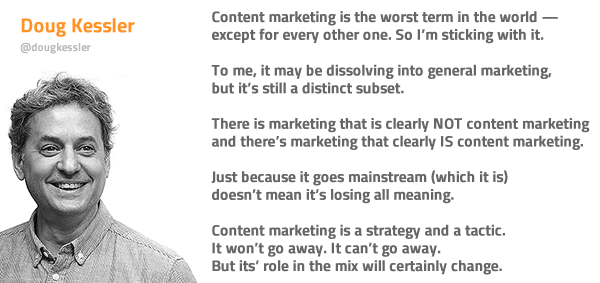
Content marketing defined for today and tomorrow: overlaps and trends
Several early content marketing adopters believe content marketing will just become marketing.
While this is obviously so, this goes for all forms of “marketing” from an integrated perspective. Nevertheless, content marketing, regardless of definitions and terms, can be clearly differentiated in many ways from other marketing tactics and approaches. Even if phenomena and activities such as corporate blogging – and, going back far more in time, storytelling – are older that the term content marketing, they are often mentioned in a content marketing context. This also means that often definitions overlap. Corporate blogging is a good example as it is defined as a content marketing practice but also as social media marketing and inbound marketing.
More about the difference between content marketing and inbound marketing here. Finally, as new – mainly digital – evolutions (also driven by consumer adoption), it’s clear that content marketing will continue to evolve, as will media evolutions, as the increasing focus on “converged media” clearly indicates.

